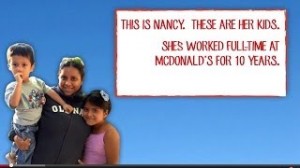McDonald’s ‘help’ line directs underpaid workers to apply for public assistance

A new video from our friends at Low Pay Is Not OK shows that McDonald’s, the company that brought its workers the handy McBudget tool, has another way to “help” its low-wage workers: a 1-800 “McResources Line” that is advertised on flyers in many stores.
Designed for employees who need financial, housing, childcare or other help, McResources operators actually direct those who call to apply for public assistance like food stamps and Medicaid.
Rather than taking responsibility to pay its workers a wage they can live on, the hotline shows McDonald’s relies on taxpayers to pick up the slack.
McGALLING
When Chicago worker Nancy Salgado, who earns minimum wage after 10 years at McDonald’s, called the McResources hotline, she was told to visit food pantries and apply for food stamps and Medicaid.
That’s McHelp for you. If you’re paid too little to get by, go to the federal government and let taxpayers pick-up the difference.
Watch a video and listen to the taped exchange here: https://labortribune.com/mcresources-help-line-is-outrageous-2/.
$7 BILLION A YEAR
Researchers at the University of California-Berkeley’s Center for Labor Research and Education recently released a report that showed fast food companies’ low wages shift nearly $7 billion in public assistance a year onto taxpayers, with McDonald’s accounting for $1.2 billion of that hidden cost.
That comes to $146 million a year in Missouri and $368 million a year in Illinois.
52 PERCENT OF WORKERS ON PUBLIC ASSISTANCE
According to the report, Fast Food, Poverty Wages: The Public Cost of Low-Wage Jobs in the Fast Food Industry, low-wage fast food jobs pay so little that 52 percent of fast food workers are forced to enroll their families in public assistance programs.
Instead of leading the way and raising wages so workers have money in their pockets to spend and lift the economy, McDonald’s and other fast food companies – a $200 billion-a-year industry – are looking to taxpayers to foot the bill for their low pay.
You can find out more and help fast food workers in the St. Louis area fight for a living wage by going to STL735.org, following #STL735 on Twitter, or liking facebook.com/STL735.


Leave a Reply